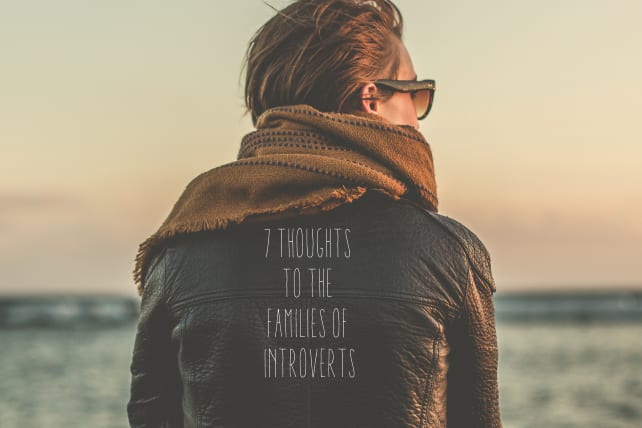Whenever I post about the subject of introversion I hear from fellow introverts. Some of these are apparently even more introverted than me. And, that’s a lot of introversion.
I usually am addressing introversion in leadership, but in talking with a young pastor after one of these posts I discovered there was another issue we needed to address. This particular pastor was having some issues at home with introversion. He had managed to be extroverted for his church, but when he got home, he had nothing left to give. He felt the tension. He wanted to push through it, but he didn’t know how. He didn’t want to talk about his day. He didn’t want to share what he was thinking. He was done. Words spent. Empty.
His wife was growing increasingly impatient with a lack of intimacy in communication, limited social life and simply feeling left out of part of his life.
Of course, I only heard his side of the story. He knows what he needs to do, but he doesn’t know how to do it.
Her side of the story (according to him)—she doesn’t understand how he can be so introverted—even when it’s with his family.
I get it. I really do.
So, this post is to the families of introverts. There are a few things I’d love to say to you. I hope they are helpful.
Here are seven words to families of introverts:
We aren’t crazy.
Sometimes you think we are, don’t you? Be honest. When we don’t talk for long periods of time—even when we are with people—you assume we must have a few screws loose somewhere. We probably do—as you possibly do—we are all desperately in need of grace. But introversion isn’t one of the things that make us crazy. We aren’t weird—OK, again, some of us might be, but not just because of introversion. In fact, you may not know this, but there are lots of introverts around. Lots. Mega lots. You may even have overlooked some of us because we aren’t always trying to get your attention. We may appear extroverted in public, often because it’s our job, but there are lots of us who are really introverted.
It isn’t personal.
When we don’t talk it’s not because we don’t want to communicate with someone. We don’t talk because we are introverted. We need to have something to say. We probably think a lot more than we say. It’s hard not to take it personally though, isn’t it? But, it most likely has little to do with you when we don’t talk to you as much as you wish we would.
We do love you.
This one is huge. The crazy thing about introverts—that I know some have a hard time believing—is that most of us really do love people. A lot. More than you can imagine. In fact, the measure of extroversion or introversion, from what I can tell, has no bearing on the degree of love a person has for others. That’s a whole other side to a person’s personality and character. If one expectation you have of love is talking a lot, you’re going to be disappointed at times. But, this may help to know—for some introverts, one expectation we have of love is giving the people we love time to not have to talk. (Figuring out how to balance those expectations is tough, isn’t it?)
We need time to recharge.
The amount of time is relative to the amount of extroversion we had to do to get to the opportunity for introversion and the degree of introversion we have. But, all of us need that time. We may even crave it. This is especially true after very extroverted events or settings. For my pastor friend I mentioned above, that’s Sunday afternoon following a Sunday morning. (Funny how Sunday afternoons always follow Sunday mornings.)
Preparation helps.
If you give us advance warning, we can often better prepare for conversation. We can gear up for it. I know that may be difficult to grasp for especially extroverted people, especially when it involves people we love so much. Please understand, though, that introversion impacts how we relate to others—not how we feel about them. I love my wife. More than anything. And, she shares my calendars so, thankfully, she knows the times I am more likely to revert to my introversion preferences. I find, however, that my wife and I having a routine time where we interact together at night is the time I’m ready to dialogue with her best about my day and hers. And, she loves this time. I do too. Seriously. It works better for me because I’m prepared for it—actually looking forward to it—and it works better for her because I actually talk. And, want to.
We don’t have a right to ignore you.
Do I need to repeat that one? I will. We don’t have a right to ignore you. And, my introverted friends can get frustrated with me if they want to, but we don’t. You can expect communication. Relationships are built on communication. We just have to figure out how to make it work with your personality and ours. We can do that, can’t we? And, you can tell them I said it. Get an outside party (such as a counselor) to help you if you need it. We can’t expect people to ignore their personality—and we should work to respect other people’s personalities—but we can expect two people in a healthy relationship to find a balance that allows healthy, intimate conversation—at a level that meets the needs of both in the relationship.
Activity often produces conversation.
This may sound strange unless you’ve experienced it, but as an introvert, I talk more—and am more comfortable doing so—when I am being physically active at the same time. Walking with Cheryl helps us communicate better. Our communication is strengthened when we have an activity we do together regularly. So, we walk often. Almost daily. It’s good for our health and our marriage. Certainly we walk enough so she feels we’ve communicated. What’s an activity you could do with your introverted family member that might produce more (and better) conversation? (Play a board game, go hiking, take a drive, etc.)
Here’s the disclaimer. Not all introverts are alike. Just as not all extroverts are alike. And, there are varying degrees of introversion and extroversion. It’s important not to put people into boxes—and that’s not what I’m trying to do here. Maybe the best follow up to this post is a conversation with your introvert on how the two of you could communicate better. More than anything, as a relationship counselor and pastor, I want to help people better communicate. Sadly, I’ve sat on the outside of dozens of relationships in trouble and communication is almost always one root of the problems in the relationship. This post isn’t counseling—and my intent was a very soft approach—but the issue here is huge for some couples. Don’t be afraid to get help if needed.
Are you an extrovert married to an introvert? Any tips you’ve learned that can help?
This article originally appeared here.












